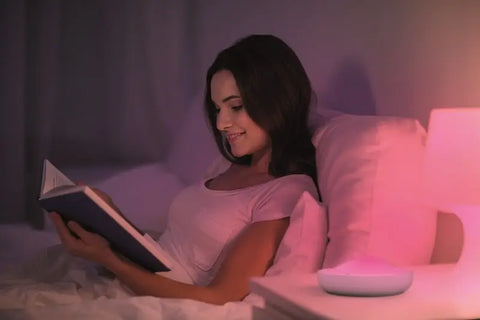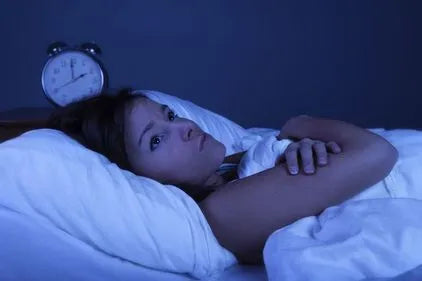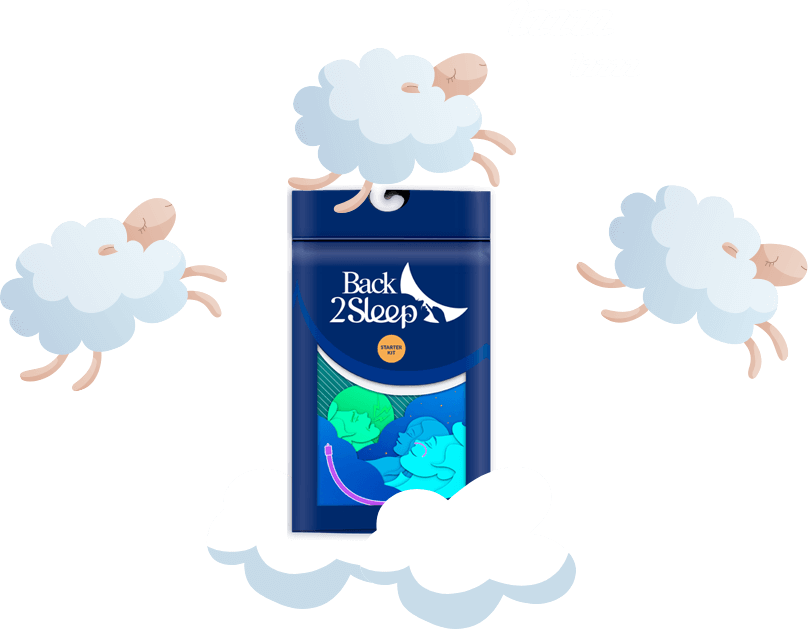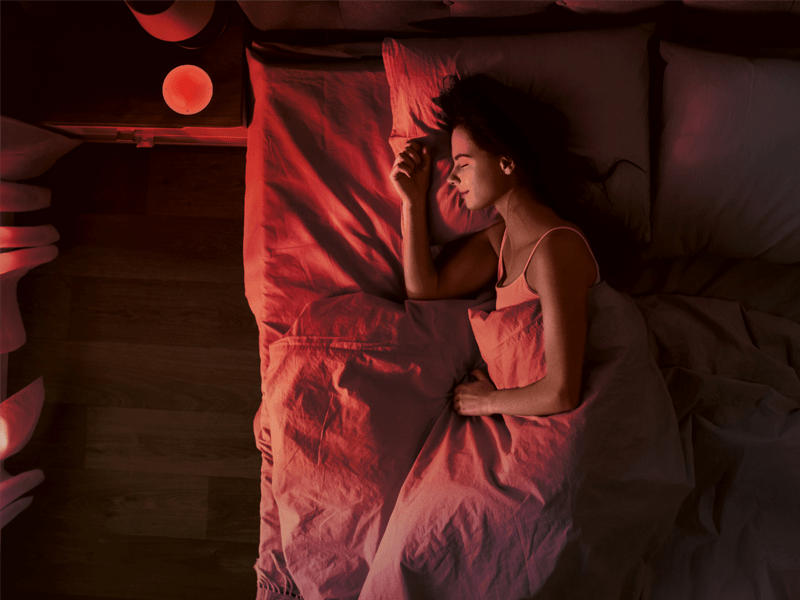Finding sleep can be a quest for some adults.
Fortunately, there are techniques to help you fall asleep !
Whether by :
💊 relaxation,
💊 optimizing the sleeping environment,
💊 adopting a diet,
💊 adopting an appropriate evening routine.
From deep-breathing exercises and soothing herbal teas to comfortable bedding and an ideally tempered bedroom, there are many solutions.
What is a sleep aid?
Sleep aid encompasses all techniques and methods designed to facilitate sleep.
So how do we distinguish between the various aids available and understand their importance for our health?
Natural methods vs. medical aids
On the one hand, we have natural methods, such as:
💊 meditation,
💊 soothing herbal teas,
💊 bedtime routines...
They aim to prepare the body and mind for rest without pharmaceutical intervention.
On the other hand, medical aids such as sleeping pills offer a quick solution, but can lead to side effects or dependency.

How important is a good night's sleep?
Sleep is a vital function that allows our bodies and minds to regenerate and restore themselves.
While we sleep, our brain sorts and consolidates the day's information, which is important for memory and learning.
Quality sleep :
💊 strengthens our immune system,
💊 regulates hormones, particularly those linked to appetite,
💊 promotes tissue repair, including the heart and blood vessels.
It also helps regulate mood and prevent anxiety and depression.
How to choose the right sleep aid?
The choice depends on your specific needs and situation.
If you're struggling with occasional insomnia, a natural approach may be all you need.
For more severe disorders, medical consultation is essential.
Listen to your body and choose a method that gives you the comfort and peace you need for a restful night.
Relaxation techniques to help you fall asleep
Guided meditation for falling asleep
In guided meditation, by focusing on the guide's voice, you immerse yourself in an altered state of consciousness where everyday worries fade away, allowing the mind to calm down.
This technique reduces stress by reducing the activity of the sympathetic nervous system. The result is a faster onset of sleep and a significant improvement in sleep quality.
How to proceed?
Find a guided meditation recording specially designed for sleep, make yourself comfortable in bed and let the voice guide you into a state of deep relaxation.
Breathing exercises to relax
💊 Deep breathing is an effective way of activating the parasympathetic nervous system, promoting relaxation and preparation for sleep.
The most effective techniques include 4-7-8 breathing, which consists of:
- inhale deeply for 4 seconds,
- to hold its breath for 7 seconds,
- exhale slowly for 8 seconds.
💊 Diaphragmatic breathing, on the other hand, involves deep, conscious breathing, filling the lungs with air, allowing the diaphragm to lower and gently massage the internal organs, inducing a relaxing effect.
By practicing these breathing exercises every night before bed, you create a soothing routine that signals to your body that it's time to slow down and prepare for restful sleep
The impact of the environment on falling asleep
Optimum temperature for sleep
A bedroom that's neither too hot nor too cold helps you get a good night's sleep.
The ideal temperature is around 18-22 degrees Celsius.
A slightly lower body temperature helps you fall asleep, so consider adjusting your thermostat or using seasonally appropriate blankets.
Reducing noise for quality sleep
Noise can be a major sleep disturbance.
Solutions can help create a quieter environment, such as:
💊 white noise machines,
💊 earplugs,
💊 sound insulation.
Lighting and its influence on falling asleep
Light greatly influences our biological clock.
We recommend reducing exposure to blue light emitted by screens before bedtime.
Make sure your bedroom is dark enough or use a sleep mask to block out any disturbing light sources.
Nutrition to help you fall asleep
Which foods are best for a good night's sleep?
Products rich in tryptophan, such as turkey or bananas, promote the production of serotonin and melatonin, key sleep hormones.
Almonds and walnuts contain magnesium, which can act as a natural muscle relaxant.
And don't underestimate the power of a good chamomile or lavender herbal tea, known for their soothing properties.
What foods should you avoid before bedtime?
💊 Avoid large, hearty meals that overload the digestive system and can disrupt your sleep.
💊 Spicy or acidic foods can cause heartburn or digestive discomfort.
💊 Caffeine, found not only in coffee but also in tea, certain soft drinks and chocolate, is a stimulant to be avoided.
💊 And while alcohol may seem to help you fall asleep, it disrupts sleep cycles and can reduce the quality of your rest.

The Back2Sleep solution, the intranasal orthosis
The intranasal orthosis by Back2Sleep works by improving nasal breathing, which can be particularly beneficial for those who have difficulty falling asleep due to mild respiratory problems, such as :
💊 snoring,
💊 mild nasal congestion.
By facilitating better air circulation, the orthosis helps to establish a regular, soothing breathing rhythm, essential for sleep induction.
Frequently asked questions about sleep aids
What's the best time to go to bed?
- The best time to go to sleep varies from person to person but is generally dictated by our circadian rhythms and individual sleep needs.
A basic rule is to follow your body's sleepy signals and try to go to bed and get up at regular times to synchronize your internal clock.
For most adults, going to bed between 9 p.m. and 11 p.m. is ideal to take advantage of natural sleep and wake cycles.
How to manage insomnia without medication?
- To combat insomnia without resorting to medication, several strategies can be adopted:
💊 establish a regular bedtime routine,
💊 create a comfortable, relaxing sleeping environment,
💊 limit consumption of caffeine and screens before bedtime,
💊 practice relaxation techniques such as meditation or deep breathing.
If insomnia persists, consulting a healthcare professional may be helpful in exploring other non-drug treatment options.
Can technology be used to improve sleep?
- Yes, technology can help you fall asleep, but only if you use it wisely.
Meditation and relaxation apps, audio books, or light therapy devices can help create a sleep-inducing routine.
However, it's crucial to limit exposure to the blue light emitted by screens, which can disrupt melatonin production and affect sleep quality.
What to do when you can't sleep?
- If you have trouble falling asleep, try getting up rather than staying in bed tormenting yourself.
Try a quiet activity such as reading or listening to soft music.
Avoid screens, as blue light can inhibit the production of melatonin, the sleep hormone.
Relaxation or meditation techniques can also help calm your mind and prepare your body for sleep.

- Al seleccionar una opción, se actualiza toda la página.
- Se abre en una nueva ventana.







